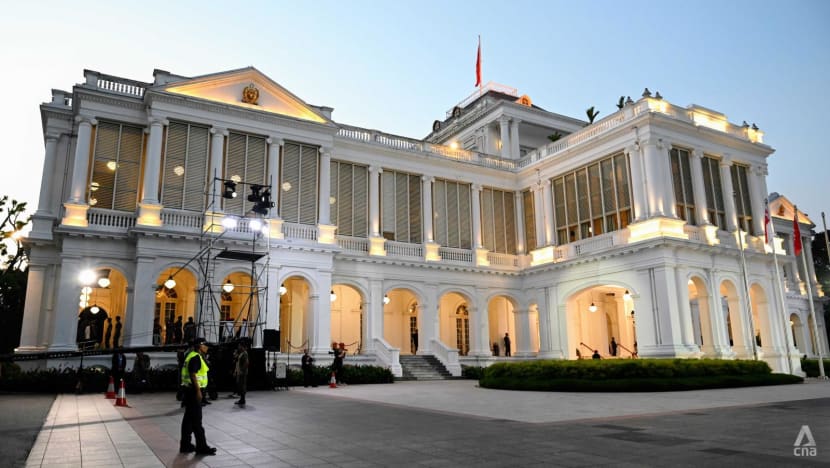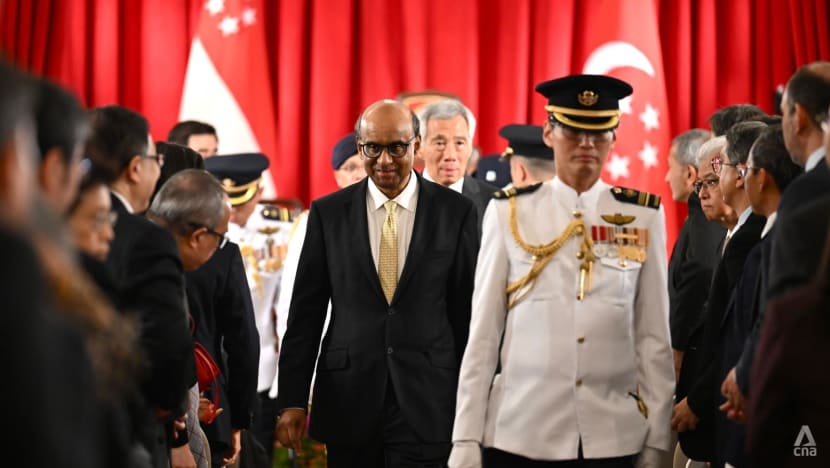CNA Explains: What are the implications of Singapore's constitutional changes involving the President?
The amendments give the government "finer control" over the head of state's involvement in foreign organisations, says one constitutional law expert.

This audio is AI-generated.
SINGAPORE: Singapore's President can now hold roles in international organisations in his private capacity.
This was after parliament on Wednesday (Nov 22) approved amendments to the Constitution, though opposition lawmakers voted against the Bill.
What are the changes?
Under the revised legal framework, Singapore’s President can accept global appointments in a private capacity, under three conditions:
- The role cannot breach existing rules in the Constitution, which already forbid the President from actively engaging in commercial enterprises
- The Cabinet - the executive branch of the government - must advise the President that it's in the national interest to accept the appointment
- The President, “acting in his discretion, must concur with the advice of the Cabinet”
In parliament on Wednesday, Deputy Prime Minister Lawrence Wong said "national interest" generally means being “helpful in advancing Singapore’s standing and interest on the international stage”.
“There should be benefits, be it direct or indirect, to Singapore as a whole," he said.
The constitutional amendments also introduce a similar framework for ministers.
Why make the changes now?
Singapore's current President, Mr Tharman Shanmugaratnam, was sworn in on Sep 14 after a landslide victory at the Sep 1 polls.
The former Senior Minister has been chairman of the board of trustees of the Group of Thirty (G30), an independent global council of economic and financial leaders, since 2017.
He also sits on the World Economic Forum’s board of trustees.
Mr Tharman, 66, co-chairs the Global Commission on the Economics of Water, which makes recommendations to the United Nations and other international forums.
And he co-chairs the advisory board for the UN Human Development Report.
Singapore's Cabinet, led by Prime Minister Lee Hsien Loong, agreed it was in the national interest for Mr Tharman to continue holding these appointments as President.
The Attorney-General however advised the Cabinet that it was "not ideal" for Mr Tharman to do so in his official capacity, said Mr Wong.
International bodies want appointees to bring with them their official status and reputations, but contribute independently to achieve the aims of the organisations.
The Cabinet thus concluded that the President should be allowed to contribute to these international roles in his “independent and private” capacity, as this would benefit Singapore.
Given the Attorney-General’s advice that such an arrangement was not “clearly provided” for by the Constitution, amendments were needed, Mr Wong added.
Assistant Professor Benjamin Joshua Ong from the Singapore Management University's Yong Pung How School of Law told CNA that President Tharman has "particularly strong" standing on the world stage due to his involvement.
"The change affirms that such activities by the President have the blessing of the government and are affirmed and recognised as being beneficial for Singapore," he added.
Could the President and ministers take up global roles previously?
With advice and support from the Cabinet, Singapore's Presidents have from time to time taken on international appointments in their official capacities, to further the national interest.
For instance, former president Tony Tan was inducted in 2012 as a member of the Honorary Senate of the Foundation Lindau Nobel Laureate Meetings, which promote global science and research.
Constitutional law experts CNA spoke to said that in their view, it has always been lawful for the President to take up a role in an international organisation.
"There is no express prohibition by law," said law lecturer Ben Chester Cheong from the Singapore University of Social Sciences (SUSS).
"But the amendment was done to be thoroughly transparent about the President’s involvement in international organisations.
"Making the changes now is important because it creates a proper and principled framework to avoid any legal or constitutional challenges in the future," he added.
"It also provides clarity and certainty for future cases, as Singapore may expect more invitations for its officeholders to serve in foreign and international organisations."
Asst Prof Ong said the changes would allow the government to exercise "finer control" over the President’s involvement in foreign organisations.
Before this, the only check on the President’s activities was the power to remove him from office on grounds such as corruption and treason, said Asst Prof Ong.
For ministers, under their existing code of conduct, they can and do already take on external roles in their private capacities - if the Prime Minister considers it to be in the national interest, and gives permission.
An example is Senior Minister Teo Chee Hean who sits on the TotalEnergies’ International Advisory Committee. Mr Teo donates to charity the honorarium he receives from TotalEnergies.
Associate Professor Eugene Tan, also from SMU, said this process became inadequate in Mr Tharman's case, when he was elected President.
"The Prime Minister can give permission to his Cabinet ministers. But the Prime Minister cannot give such permission to the President, so that necessitates something more than just an administrative arrangement," he said.
"You could have made the process through an ordinary piece of legislation, but the government's assessment is that it is important enough for it to be put in the Constitution."

What are the pros and possible cons?
On Wednesday, Mr Wong and a few Members of Parliament (MPs) argued that taking on global roles would let the Singaporeans make significant contributions and shape thinking globally, in the interest of the country.
Mr Cheong told CNA that it would also enhance Singapore’s reputation and influence in the global arena, creating more opportunities for cooperation and exchange, and exposing the officeholders to new perspectives and challenges that may benefit their future roles back home.
At the same time, other lawmakers flagged concerns over the potential for conflict of interest and how such roles might affect official duties.
Another bone of contention was over the backdating of the constitutional amendments to Sep 14, when Mr Tharman took office as President.
Assoc Prof Tan said the backdating would fill the gap between now and when Mr Tharman was sworn into office, as the President has continued to hold on to his global appointments.
This was done "out of an abundance of caution" and would help avoid possible arguments that holding on to these appointments was unconstitutional, said Assoc Prof Tan.
"Is the country worse off as a result of the backdating? As far as I can tell, the opposition did not provide any evidence on that ... they were just essentially nitpicking."
Asst Prof Ong reiterated it was not the case that the backdating had made what was once unlawful, lawful.
Public reaction to the passing of the Bill was mixed, with some online voices questioning if it would pave the way for more constitutional amendments being introduced after officeholders take up global appointments.
It may not be fair to assume this scenario, said Mr Cheong.
The amendments include safeguards and criteria to ensure that appointments are in the national interest and do not compromise the officeholders’ duties and obligations, he pointed out.
"These appointments to international bodies are also exceptional and rare," he added. "They are not meant to create a revolving door between public office and private sector."





